South Africa’s ruling African National Congress has forgotten that the outside world’s principled rejection of neutrality sustained the struggle against apartheid, Johannesburg-based political analyst Eusebius McKaiser writes for Foreign Policy.
Earlier this week, South African President Cyril Ramaphosa announced the formation of a delegation of leaders from six African countries — including his counterparts from Zambia, Senegal, Republic of Congo, Uganda and Egypt — to meet separately with Ukrainian President Volodymyr Zelensky and Russian President Vladimir Putin in a bid “to find a peaceful resolution to the devastating conflict,” The Washington Post reports.
Four of these countries abstained from a U.N. vote last year that condemned the Russian invasion, while South Africa has been accused by U.S. officials of proving weapons and ammunition to Russia via a cargo ship that secretly docked at a naval base near Cape Town last December.
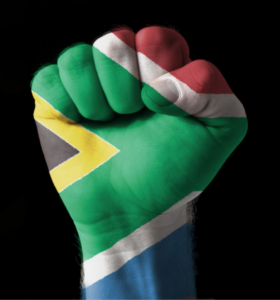
Credit: TUSAM
The whole incident, with denials and vague not-quite-walkbacks and accusations, could spark a larger rethink of how Washington views its relationship with South Africa, Robbie Gramer and Jack Detsch write for Foreign Policy.
South African foreign policy is supposed to be conducted in accordance with the values and principles set forth in the constitution, which include the promotion of human rights and democracy, notes Michael Walsh, an Adjunct Fellow at Howard University’s Center for African Studies. The South African government has not appeared bothered by this apparent contradiction. From its perspective, it is a reasonable stance in a world characterized by an “unequal application” of Western principles.
As recently as last year, Rorisang Lekalake and Evan Lieberman could write of South Africa’s democratic resilience in the Journal of Democracy. But Walsh and Phiwokuhle Mnyandu suggest that the country is on a troubling trajectory that risks the stability of the state, could imperil democracy and lead to some form of authoritarian government.
South Africa’s stance on Ukraine is partly explained by the ideological legacy of the anti-apartheid struggle, during which the African National Congress was effectively dominated, if not covertly led by the pro-Soviet South African Communist Party (SACP).
Some surprisingly common South African first names—such as Soviet, Moscow and Lenin—are living tributes to these old ties, The Economist observed. Sputnik Ratau, born shortly after the first satellite’s launch, is a spokesman for the water and sanitation department. A high school in KwaZulu-Natal is named after Eric Mtshali, a stalwart of the struggle who spent decades in exile and goes by the nickname “Stalin”.
The ANC has governed South Africa as part of a tripartite alliance — a political marriage with the SACP and the Congress of the South African Trade Unions (Cosatu).
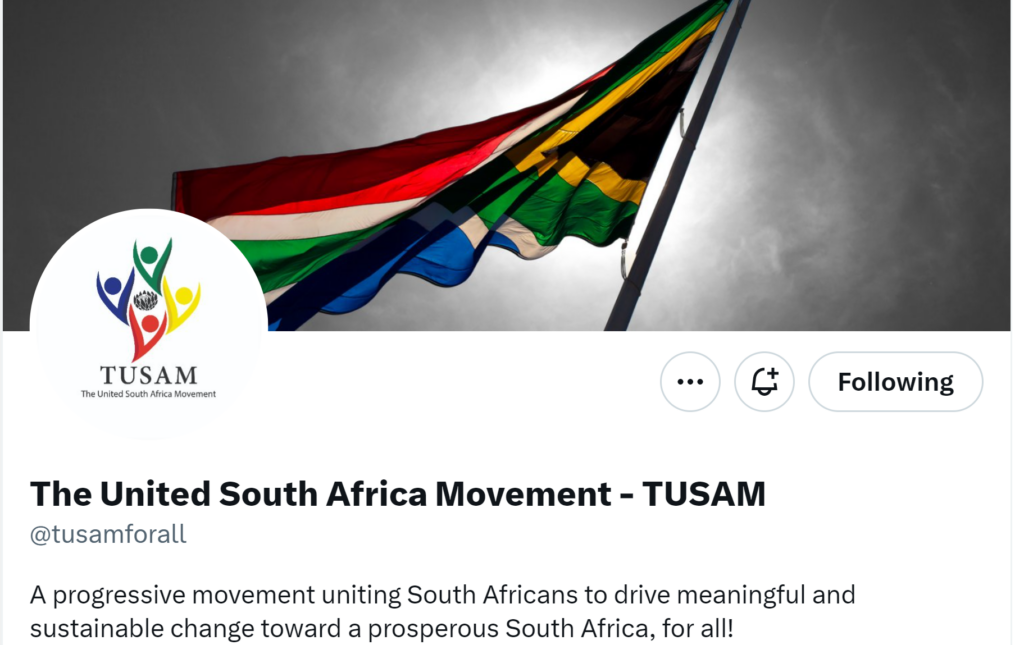 A new civil society initiative, The United South Africa Movement, was launched last month (above). It aims to establish a People’s Summit to “interrogate the trajectory” the country has taken since the democratic transition.
A new civil society initiative, The United South Africa Movement, was launched last month (above). It aims to establish a People’s Summit to “interrogate the trajectory” the country has taken since the democratic transition.
Nelson Mandela once said that if the ANC does to us what the National Party did to us, we must do to the ANC what we did to the National Party. The United South Africa Movement (TUSAM) is such a movement, wrote was invited by TUSAM founder Solly Moeng to attend an online meeting.
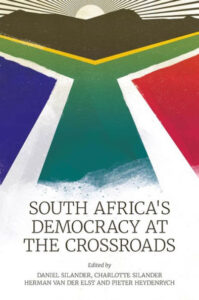 While its constitutional arrangements have survived, South African democracy seems to have weakened by state capture, internal ANC implosion, corruption, societal polarization, social exclusion, xenophobia, and threats of state economic bankruptcy, say the authors of a recent book, South Africa’s Democracy At The Crossroads.
While its constitutional arrangements have survived, South African democracy seems to have weakened by state capture, internal ANC implosion, corruption, societal polarization, social exclusion, xenophobia, and threats of state economic bankruptcy, say the authors of a recent book, South Africa’s Democracy At The Crossroads.
Ukraine’s Deputy Foreign Minister Emine Dzhaparova has pointed to outsize Russian influence in the so-called global South. She visited India last month, where she observed a “deficit of information” about Ukraine, given both its geographical remove from South Asia as well as the imprint of “Soviet epoch thinking” that persuaded many of her Indian interlocutors that Ukraine and Russia were ultimately part of the same political or national entity, The Post’s Ishaan Tharoor adds.
“I had to really put some effort to explain that we’re not one nation, that this is exactly why we have this war, which is an existential war,” she said, explaining how Putin could not countenance a Ukraine that sees itself as part of the West and as a “European nation.”
Dzhaparova’s message to the countries seeking to mediate the conflict was stark: They should “be on the right side of history,” she said, and “not support evil and not be part of this evil.”
South Africa continues to claim that it is nonaligned and is not supporting Russia. Yet it has not condemned the invasion of Ukraine, as 143 other countries did in a General Assembly vote on Oct. 12, 2022, adds Dov S. Zakheim, a senior adviser at the Center for Strategic and International Studies and vice chairman of the board for the Foreign Policy Research Institute.
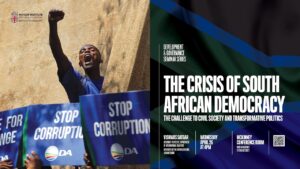 Moreover, last month, a Russian Ilyushin-76 cargo jet landed at the Waterkloof Air Force base outside Pretoria to unload and load unspecified cargo. A sanctioned Russian cargo airline called Aviacon Zitotrans operates the aircraft. The South African government stated that the aircraft was delivering mail for the Russian embassy. It failed to explain, however, why a plane that can carry 110,000 pounds of cargo was needed to deliver mail, he writes for The Hill:
Moreover, last month, a Russian Ilyushin-76 cargo jet landed at the Waterkloof Air Force base outside Pretoria to unload and load unspecified cargo. A sanctioned Russian cargo airline called Aviacon Zitotrans operates the aircraft. The South African government stated that the aircraft was delivering mail for the Russian embassy. It failed to explain, however, why a plane that can carry 110,000 pounds of cargo was needed to deliver mail, he writes for The Hill:
Reuben Brigety, the U.S. Ambassador to South Africa, stated that reports about the shipment were accurate. Brigety is a serious individual, a scholar and analyst, who would not make such an assertion if he doubted its veracity. Nevertheless, he tweeted what appeared to be a retraction in the face of a furious response from South Africa’s Department of International Relations and Cooperation. As media observers pointed out, however, Brigety’s tweet that he was able to “correct any misimpressions left by my public remarks” was not exactly a full-throated retraction.
South Africa’s clumsy pas de deux with Russia is an object lesson in how not to play the non-aligned game. It is lucky that the Biden administration does not seem inclined to penalise it for its erraticism, The FT’s Alec Russell adds:
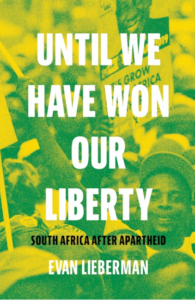 When the histories of the war in Ukraine are written, it seems a fair bet that the African mediating mission announced by South Africa’s president Cyril Ramaphosa this week will struggle to make a footnote. Would-be mediators are two-a-penny these days, and anyway South Africa has marked its card as being rather too cosy with Moscow to be a credible interlocutor with Ukraine.
When the histories of the war in Ukraine are written, it seems a fair bet that the African mediating mission announced by South Africa’s president Cyril Ramaphosa this week will struggle to make a footnote. Would-be mediators are two-a-penny these days, and anyway South Africa has marked its card as being rather too cosy with Moscow to be a credible interlocutor with Ukraine.
Sometimes South Africa is a democracy with a progressive constitution and a moral clarity in matters of equity and social justice. The next time you look it is throwing in its lot with dictators in the name of a new multipolar world that will break western hegemony. Even the ruling African National Congress isn’t sure what the country’s foreign policy is, Russell’s FT colleague David Pilling adds:
The haphazard nature of South Africa’s foreign policy owes much to the ANC’s misplaced nostalgia for the Soviet Union, which helped finance its liberation struggle against apartheid. Leave aside the fact that the Soviets murdered millions of their own citizens and created an empire of unwilling subjects. The ambiguous stance may also be related to links between Russian oligarchs and the ANC, which have bought a loyalty of another kind.
South Africa’s ruling African National Congress (ANC) party has close ties with Moscow, dating back to the Soviet Union’s support for the anti-apartheid movement, CNBC News adds. This history was flagged by South African Foreign Minister Naledi Pandor during Lavrov’s visit, in which she lauded a deepening relationship between the two countries as part of a “redesigned global order.”
Formed in 1912 as a conventional “civil rights” movement dedicated to using peaceful persuasion to gain inclusion in the white-controlled polity, the ANC suffered constant rebuffs (culminating in its banning in 1960) that spurred an inevitable drift toward the militancy signalled by its alliance with the South African Communist Party, according to Steven Friedman, director of the Johannesburg-based Centre for Policy Studies. Today both the earlier civil rights ethos and the later militant ethos may be found within its ranks, he wrote for the Journal of Democracy.
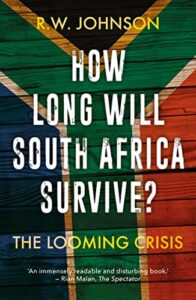 For over thirty years SACP and ANC activists criss-crossed the Soviet bloc, happily accepting the “People’s Democracies” at face value, R.W. Johnson, the author of “How Long Will South Africa Survive? The Looming Crisis,” observed. They all regarded themselves as revolutionaries, first and foremost, yet the irony was that they didn’t recognize for one moment that they were living in not one but multiple revolutionary situations. For the truth was that everywhere in the People’s Democracies a majority of the population longed to overthrow the regimes that ruled them.
For over thirty years SACP and ANC activists criss-crossed the Soviet bloc, happily accepting the “People’s Democracies” at face value, R.W. Johnson, the author of “How Long Will South Africa Survive? The Looming Crisis,” observed. They all regarded themselves as revolutionaries, first and foremost, yet the irony was that they didn’t recognize for one moment that they were living in not one but multiple revolutionary situations. For the truth was that everywhere in the People’s Democracies a majority of the population longed to overthrow the regimes that ruled them.
As recently as 2009, around a third of the ANC’s MPs and ministers were members of the South African Communist Party, and most of the rest still relied on vulgar Marxist terminology, noted Johnson.
Apparently many in the ANC believe that Russia will somehow get South Africa a permanent seat on the UN Security Council, he adds. Nonetheless, it’s possible that the Russian alliance will see the ANC through at least one more time. But Ramaphosa needs to think hard. If things were to go that way South Africa would end up aligned with the non-democratic camp, as dependent on Putin as Belarus and with crippling Western sanctions only too likely.
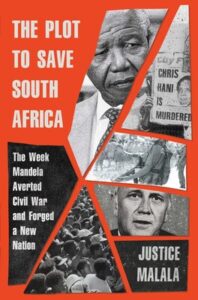 Straight after his death the SACP proudly announced that Nelson Mandela had been a member of its Central Committee at the time he went to jail, according to Johnson. Indeed, he never formally resigned from this position, though he clearly drifted away from the party while on Robben Island. The ANC’s armed wing, Umkhonto we Sizwe (Spear of the Nation, or MK), was a 100% Communist organization and Mandela, who headed it, was then on the Party’s Central Committee, a fact about which he lied both in court and later in his autobiography, he adds.
Straight after his death the SACP proudly announced that Nelson Mandela had been a member of its Central Committee at the time he went to jail, according to Johnson. Indeed, he never formally resigned from this position, though he clearly drifted away from the party while on Robben Island. The ANC’s armed wing, Umkhonto we Sizwe (Spear of the Nation, or MK), was a 100% Communist organization and Mandela, who headed it, was then on the Party’s Central Committee, a fact about which he lied both in court and later in his autobiography, he adds.
South Africa today cannot be celebrated as a model of the rule of law, or democratic governance that works for the population. The country’s independent judiciary and robust civil society continue to be real sources of strength, but they shine in part because they push back on an increasingly dysfunctional state, Council on Foreign Relations expert Michelle Gavin insists. Over and over, South African words and deeds demonstrate that what would seem to be fertile ground of shared interests and values in democratic societies is, for the time being, a mirage.
The Plot to Save South Africa, Justice Malala’s new book on the assassination of SACP leader Chris Hani notes that the incendiary climate following the murder focused minds on both sides, Birkbeck’s Gavin Evans writes for The Conversation. Mandela, his lead negotiator Cyril Ramaphosa, and other ANC leaders successfully used the moment to press for an election date and a Transitional Executive Council to run the country until the first democratic election. This was hugely significant. It meant that the ruling National Party, the party of apartheid, could no longer call the shots before the election.
Sometimes #SouthAfrica is a #democracy with a progressive constitution. The next time you look it is throwing in its lot with #dictators. Even the ruling ANC isn’t sure what the country’s foreign policy is, @FT Africa Editor @davidpilling observes. https://t.co/Zx4kGTOLYB
— Democracy Digest (@demdigest) May 19, 2023







